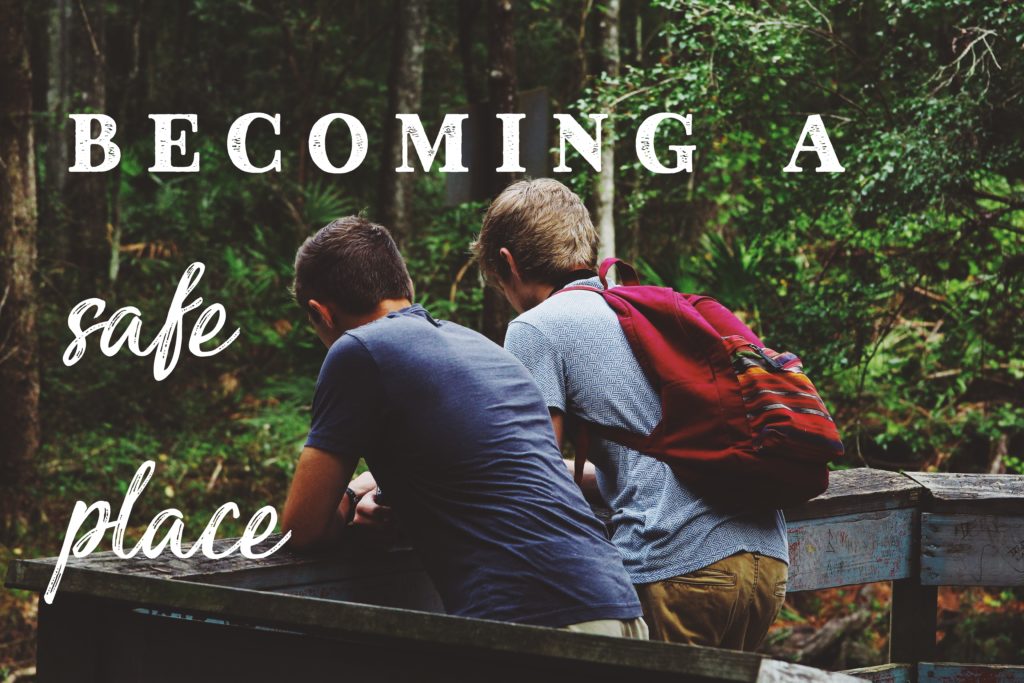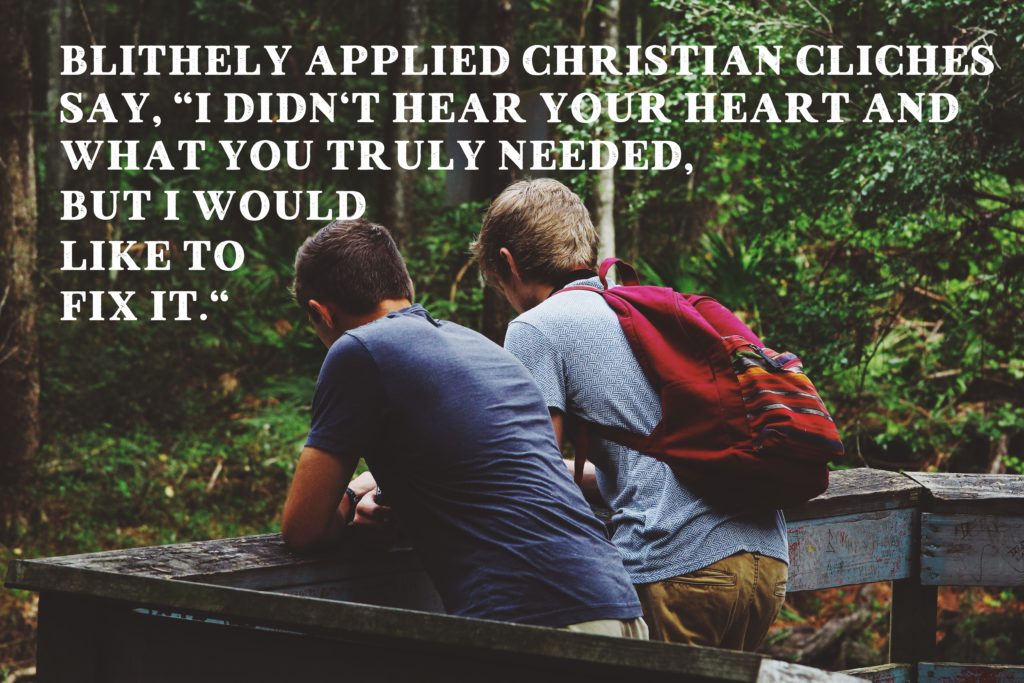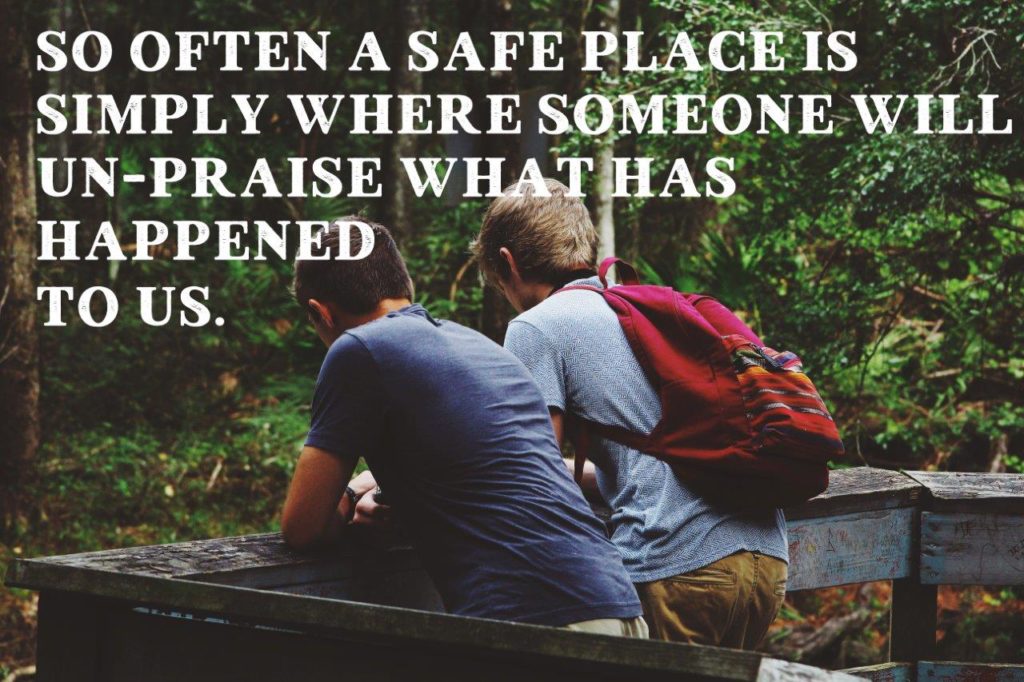
Missed the first post? Grab it here.
I must have been seventeen. I still remember the room and where I was sitting in it. Sadly, I don’t remember the exact nature of the trauma that had come upon one of the youth group members, which was explained as we listened in relative silence that Sunday morning. I do know someone had died. But I remember the youth leader giving us advice about how to help those around them, and I specifically remember this: Here’s what not to say. Don’t tell them this was God’s will.
I remember startling at this. Perhaps it’s a sign of my emotional immaturity at that point, because I recall listening intently to understand why we would be told not to say something that is the truth. I suppose in my mind, to comfort people, we tell them the truth. Which is, in a sense, accurate. But there’s a reason Ephesians 4:15 adds a critical clause at the end: speaking the truth in love.
Because truth without love lacks full truth, really (just as love without truth isn’t fully loving). God tells the truth in the context of a specific relationship. To Hagar, He is the God who sees. To Elijah, He is a whisper. To Moses, He is a bush aflame yet unconsumed. So from this, I’m taking lessons on how to be a person of refuge.
Today’s thought: Eighty-sixing platitudes. I’m talking, y’know, overused clichés, doled out as wisdom. Perhaps one of my favorite articles from Boundless.org: 5 Christian Cliches That Need to Die.
Sadly, it’s the misplaced Bible verses and trite Christian sayings that poke out like a hangnail when we’re processing grief, leaving us a little rawer, a little more inflamed.

The Problem with Platitudes
What gives, though? Do we need to be more creative wordsmiths, verbalizing something more floral and creative?
Not in my mind. The offense of platitudes can lie in what they’re truly communicating: Your problem is plug-and-play. I see a puzzle piece that fits; I press it in. I will choose something used for someone else’s problem and apply it to yours. Read: You are a problem to be solved. I didn’t hear your heart and what you truly needed, but I would like to fix it. (A favorite cliché of my own: To someone who only has a hammer in their toolbox, everything looks like a nail.)
So often, when we’re sharing our hearts—that holy ground—we are looking for someone to simply bear a burden too leaden and misshapen for our own shoulders to bear. Galatians chimes in here: Bear one another’s burdens, and so fulfill the law of Christ. This verse keeps me guessing. How does the former totally satisfy the latter? I think it’s because burden-bearing is messy and self-sacrificial and involved, and decidedly un-formulaic.
Author, pastor, and missionary Dave Furman, who suffers from a painful nerve disease, relates that the word sympathy literally means “a shaking of the head” with someone. So often a safe place is simply where someone will un-praise what has happened to us. This is not right. This stinks. It is not how God intended this world to be.

The Dark Questions
Sometimes, a hurting friend asks “Why?” But she really means, This doesn’t make sense. I’m lashing out. If we answer the surface questions without understanding their source, we get the answer wrong. Is she ready for the answers we’re so eager to give?
Furman, in his excellent book, Being There: How to Love Those Who Are Hurting, composes in my favorite chapter yet a Ten Commandments of “Whatever You Do, Don’t Do These Things.” Among them is #7: Don’t be Hyperspiritual. He writes,
“Praise the Lord your baby has passed away. Her pain is now gone, and she is with Jesus!”
I read a real story of a real pastor who went up to a real mother who had just lost her real baby and said those words above…The mom was shocked. She couldn’t believe the insensitivity of this comments.
[Other comments like] “turn to God and it will be all right”….could even be offensive, because you’re implying that the person is not praying or trusting God in those moments.
It’s also wise to refrain from “playing God” in your interaction with those who are suffering. Don’t try to explain what God is doing behind the scenes: “That baby was just not meant to be born.”
I’ve posted before about grief, and our need as Christians to have answers for some of the baffling, honestly soul-rattling circumstances God allows to happen among us. I need to confess that sometimes I have been hasty to set aside the ambiguity I loathe–ambiguity about what can only be God’s character. I have flailed about for answers that often fail to fully encompass the horror before me. See? It fits. The world is right again.
But Jesus knew every truth there on his knees in the dirt of Gethsemane. He knew God had a plan, knew God would resurrect Him. But He needed to grieve, to cry out, to commune with God in his abject pain.
More than leaping to a resurrection, a safe person stops and absorbs some of the weight.
Where are You?
Platitudes actually can have their place. (It’s how they became platitudes; they’ve got something to say.) Wisdom is vital when we’re stumbling around in the wilderness of a prodigal child or infertility or a staggering diagnosis. As a matter of fact, say you’re lost in a forest, bleeding in a cave, with a guide on a walkie-talkie who’s got a map. Do you need them to lead you out? Absolutely. But they might not see the cave on the map. They can’t get you bandages or a splint. Walkie-Talkie-Dude asks, Where are you? And says, Tell me what you see around you. And Sit down—first let’s get you able to walk.
The key in that guidance is timing and mutual understanding—an appreciation of the complexity of the situation. God Himself asks questions throughout Scripture before He speaks. A blithe, helpful word at the wrong time flattens its potential, oversimplifying a person’s need.
The Un-Hero
Sometimes, a person of refuge embraces the humility of, I don’t know what to say. Ultimately, that may be the first thing I’m unconsciously looking for in a safe place: humility, nothing inflated or deflated about what you can offer. You might even be secure enough that if I go to someone else, you don’t have to find your identity in being the hero or answer-man (-woman). Because God made us all as a body. (I’m the guy applying first aid, but I don’t have a clue how to get you outta here.)
Of course we want to offer wisdom and true words of help. Yes, especially from the Bible. So my goal isn’t to make us gun-shy. I’d just recall the heart of Proverbs : A word aptly spoken is like apples of gold in settings of silver (25:11)… Where words are many, sin is not absent (10:19). It’s all too easy for me to find my identity as the helper, the one who had “just what she needed”, and to move from Loving Friend to Resounding Gong, Clanging Cymbal who needs to put a sock in it and just. Listen.
In safe relationships, we can be—in a broader sense than marriage—naked and unashamed, rather than naked and suddenly embarrassed (because the answer was so easy, or if we’d only known). We’re exposed and accepted, rather than exposed and rejected.
That, I think, is safety.
Grab the next post in this series here:
The Safe Place Series, #3: Practical Tips to Becoming a Person of Refuge
Like this post? You might like
The Safe Place Series, #1: Becoming a Friend Who Can Help







